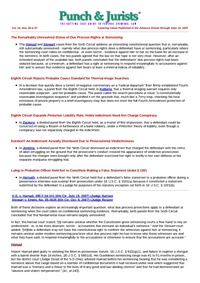U.S. v. Hamad, 495 F.3d 241 (6th Cir. July 19, 2007) (Judge Sutton)
Stewart v. Erwin, No. 05-4635 (6th Cir. Oct. 9, 2007) (Judge Rosen)
Both of these decisions explore an increasingly important question: what due process protections apply to a defendant at sentencing when the court relies …
In Pinkerton v. U.S., 326 U.S. 640 (1946), the Supreme Court established the so-called "Pinkerton" theory of co-conspirator liability which exposes a defendant to criminal liability for substantive crimes committed by another if they are reasonably foreseeable as a necessary consequence of the conspiracy. In Pinkerton, the two defendants …
Here a divided panel from the Ninth Circuit dismissed an indictment that charged the defendant with the crime of alien smuggling on the ground that the prosecutor’s conduct created the appearance of vindictive prosecution.
This is a rare vindictive prosecution case in which a divided panel from the …
Here the Court addressed a sentencing issue that is substantially unresolved - namely, what due process rights does a defendant have at sentencing; and the Court held that, at a minimum, he has to right to challenge erroneous information.
U.S. v. Hamad, 495 F.3d 241 (6th Cir. July …
For a commentary on this decision, see "Panel Upsets Detention Order Imposed on L.I. Couple," by Mark Hamblett, The New York Law Journal, July 10, 2007, as follows:
"A Long Island couple accused of holding two Indonesian women as slaves for five years will be freed on bail pending …
For a summary of the holding in this case, see "Circuit Finds Wrong Version of Guidelines Applied in Fraud Case," by Mark Hamblett, as published in the New York Law Journal on July 9, 2007, as follows:
"The timing of his crimes is making a world of difference for …
Here a divided panel from the Ninth Circuit dismissed an indictment that charged the defendant with the crime of alien smuggling on the ground that the prosecutor’s conduct created the appearance of vindictive prosecution.
This is a rare vindictive prosecution case in which a divided panel from the …
In a decision that quickly drew a torrent of negative commentary as a “radical departure” from firmly established Fourth Amendment law, the Court held that a thermal imaging warrant requires only reasonable suspicion - and not probable cause.
In 2004, Minnesota law enforcement officials applied for and received …
